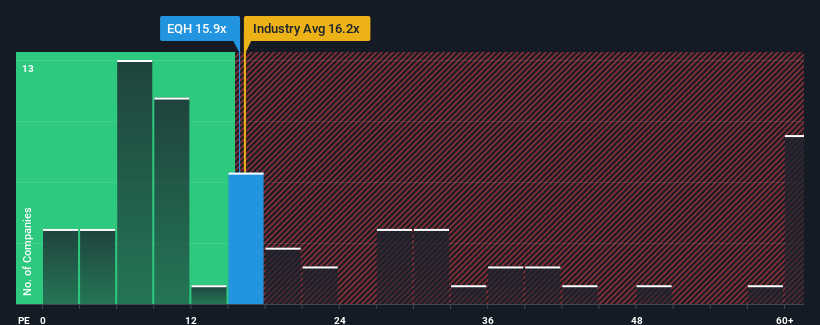- United States
- /
- Diversified Financial
- /
- NYSE:EQH
Fewer Investors Than Expected Jumping On Equitable Holdings, Inc. (NYSE:EQH)

With a median price-to-earnings (or "P/E") ratio of close to 18x in the United States, you could be forgiven for feeling indifferent about Equitable Holdings, Inc.'s (NYSE:EQH) P/E ratio of 15.9x. However, investors might be overlooking a clear opportunity or potential setback if there is no rational basis for the P/E.
Equitable Holdings has been struggling lately as its earnings have declined faster than most other companies. One possibility is that the P/E is moderate because investors think the company's earnings trend will eventually fall in line with most others in the market. You'd much rather the company wasn't bleeding earnings if you still believe in the business. If not, then existing shareholders may be a little nervous about the viability of the share price.
View our latest analysis for Equitable Holdings

What Are Growth Metrics Telling Us About The P/E?
Equitable Holdings' P/E ratio would be typical for a company that's only expected to deliver moderate growth, and importantly, perform in line with the market.
Retrospectively, the last year delivered a frustrating 40% decrease to the company's bottom line. At least EPS has managed not to go completely backwards from three years ago in aggregate, thanks to the earlier period of growth. Therefore, it's fair to say that earnings growth has been inconsistent recently for the company.
Turning to the outlook, the next three years should generate growth of 47% each year as estimated by the eight analysts watching the company. That's shaping up to be materially higher than the 10% per year growth forecast for the broader market.
With this information, we find it interesting that Equitable Holdings is trading at a fairly similar P/E to the market. Apparently some shareholders are skeptical of the forecasts and have been accepting lower selling prices.
What We Can Learn From Equitable Holdings' P/E?
Typically, we'd caution against reading too much into price-to-earnings ratios when settling on investment decisions, though it can reveal plenty about what other market participants think about the company.
Our examination of Equitable Holdings' analyst forecasts revealed that its superior earnings outlook isn't contributing to its P/E as much as we would have predicted. There could be some unobserved threats to earnings preventing the P/E ratio from matching the positive outlook. At least the risk of a price drop looks to be subdued, but investors seem to think future earnings could see some volatility.
It's always necessary to consider the ever-present spectre of investment risk. We've identified 2 warning signs with Equitable Holdings, and understanding them should be part of your investment process.
If P/E ratios interest you, you may wish to see this free collection of other companies with strong earnings growth and low P/E ratios.
Valuation is complex, but we're here to simplify it.
Discover if Equitable Holdings might be undervalued or overvalued with our detailed analysis, featuring fair value estimates, potential risks, dividends, insider trades, and its financial condition.
Access Free AnalysisHave feedback on this article? Concerned about the content? Get in touch with us directly. Alternatively, email editorial-team (at) simplywallst.com.
This article by Simply Wall St is general in nature. We provide commentary based on historical data and analyst forecasts only using an unbiased methodology and our articles are not intended to be financial advice. It does not constitute a recommendation to buy or sell any stock, and does not take account of your objectives, or your financial situation. We aim to bring you long-term focused analysis driven by fundamental data. Note that our analysis may not factor in the latest price-sensitive company announcements or qualitative material. Simply Wall St has no position in any stocks mentioned.
About NYSE:EQH
Equitable Holdings
Together with its consolidated subsidiaries, operates as a diversified financial services company worldwide.
Good value with adequate balance sheet.
Similar Companies
Market Insights
Community Narratives


